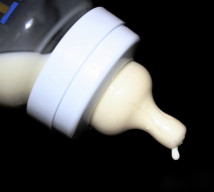
The recent Sindh Protection and Promotion of Breastfeeding and Child Nutrition Act of 2013 has been a positive development. However, implementation is needed to ensure that baby formula companies are not feeding or bribing the minds of gynaecologists to promote their products. While it is important to give new mothers alternative options in case of birthing complications, breastfeeding should be advised to all new parents as well as other stakeholders, such as grandparents. It would take only an educational campaign using mass media to disseminate the information. For a country teeming with births every day and with a recent annual growth of 1.7 per cent in 2012, according to data from the World Bank, this is a critical requirement. The natural act of breastfeeding is important for the mother-child relationship as well as for the development of the child into a healthily attached human being. While our scientific research departments may not be as well endowed to make discoveries for the benefit of human wellbeing, our provincial health departments certainly need to keep pace with the healthcare demands of a growing population. There is a dearth of education for both men and women when it comes to human health and safety. Our masses should not rely on physicians to give them basic knowledge about health but instead must be equipped with basic information even before visiting a doctor through a nationwide, long-term health education campaign focusing on maternal and neonatal health.
Published in The Express Tribune, August 12th, 2014.
Like Opinion & Editorial on Facebook, follow @ETOpEd on Twitter to receive all updates on all our daily pieces.
COMMENTS (5)
Comments are moderated and generally will be posted if they are on-topic and not abusive.
For more information, please see our Comments FAQ

























1714024018-0/ModiLara-(1)1714024018-0-270x192.webp)









Well needed editorial by Express Tribune. Unfortunately, Pakistan has the highest bottle-feeding rates and lowest exclusive breastfeeding rates in South Asia. The percentage of exclusively breast-fed children has remained static, with just a microscopic increase evident over the last 7 years. According to the Demographic Health Survey, this percentage has risen only from 37.1 per cent in 2006-07 to 37.7 per cent in 2012-13. However, when it comes to the bottle-feeding race, Pakistan has no close competitors; bottle-feeding rates have risen from an already undesirable 32.1 per cent in 2006-07 to a shamefully high 41 per cent in 2012-13. On the other hand in Bangladesh, the rate of exclusive breastfeeding for six months is 64% while in Nepal it is 70%. Bangladesh was able to increase the rates from 43% in 2007 to 64% in 2012 by commitment at all levels. This was also possible because of the active involvement of the civil society and media in the campaigns for the promotion and protection of breastfeeding.
Breastfeeding rate can be increased in Pakistan through implementation of the breastfeeding and marketing code, effective targeting of healthcare providers for improved breastfeeding counselling; revision of undergraduate curriculum with a greater emphasis on good infant and young child feeding (IYCF) practices; creation of baby-friendly health facilities, formulation of behavior change strategies to promote the culture of breastfeeding; development of effective messages on IYCF; and counselling of women of all education levels.
Excellent article covering multi dimensional review of breastfeeding.One of the important point mentioned in the article is that "implementation is needed to ensure that baby formula companies are not feeding or bribing the minds of gynaecologists to promote their products".This is very important factor ,at one side formula manufacturers companies obliging the pediatrician & gynecologist to get their support in prescribing formula milk but on the other side we cannot get rid of these companies or discourage them as there are many examples where these pharmaceutical companies have donated life saving equipments to the Govt Hospitals where there are acute shortage of funds .In this situation these companies are the only hope for saving the life of hundreds of neonates by providing oxygen cylinders,nebulizers, Acons for the wards etc. For the purpose of implementation Protection of Breastfeeding & young child feeding act ,the Govt have to give its commitment and to take the ownership otherwise organizations and civil society will keep on speaking & advocating for the rights again & again with no outcome as yet.
Writer has produced an excellent article on positive development for “Protection and Promotion of Breastfeeding and Child Nutrition Act of 2013. While I realize that some parents will make the choice to artificially (formula) feed their infants, it is important that breastfeeding be supported as the norm for newborns and infants. Gynecologists, family members and civil societies, infant feeding board itself as leaders in promoting breastfeeding and play important role in breastfeeding support and education to avoid the direct or implied endorsement of artificial baby milks (formula). We do have legislation at the federal level since 2002 and in Punjab, Sindh and Balochistan however, implementation is big question mark. The Federal and Provincial Governments should take effective steps for the promotion and protection of breastfeeding in Pakistan. Federal Government had notified the Infant Feeding Board on October 07, 2013 however, its first meeting has never been called. It is already very delay.
Excellent editorial on a very important but neglected subject. Pakistan has the third highest neonatal mortality rate in the world and is not on track to acheive MDG 4 about two third reduction in under 5 mortality by 2015. According to experts at least 22 per cent neonatl deaths could be prevented by early initiation of breastfeeding. According to the Pakistan Demographic and Health Survey 2006-07 exclusive breastfeeding for six months rates were 37.1 per cent. Exclusive breastfeeding for six months increase by .6 per cent to 37.7 per cent according to PDHS 2012-12. While in the same period Bangladesh was able to increase its exclusive breastfeeding for six months rates to 64 per cent from 43 per cent. Why can't this be done in Pakistan? We do have legislation at the federal level since 2002 and in Punjab, Sindh and Balochistan however, implementation is big question mark. The Federal and Provincial Governments should take effective steps for the promotion and protection of breastfeeding in Pakistan. Infant Feeding Boards should be notified and immediately effective steps should be taken for the implementation of the breastfeeding laws. Federal Government had notified the Infant Feeding Board on October 07, 2013 however, its first meeting has never been called. Why this delay?
When you write, please write in POINTS. It is really scary to see long paragraph without any BOLD content, which we could read to get idea of article.
Read some "How to improve readability".